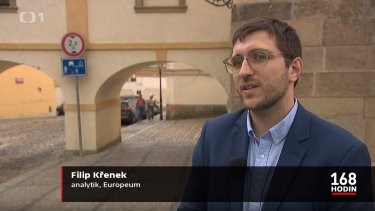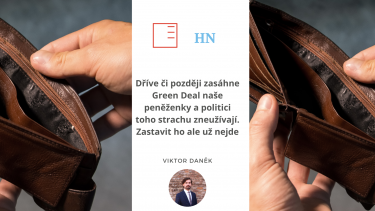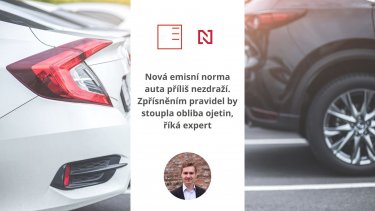168 hodin | Who is the surprise of the European election?
Filip Turek, originally an outsider, pulled the Přísaha and Motorists coalition into third place and gained more than ten percent of the vote. He bet on a ban on internal combustion engines and social networks. How realistic are his election promises? Who did he take votes from and who helped him? Filip Křenek, Project Coordinator and Analyst at EUROPEUM Institute, commented on the topic for Czech Television's investigative programme 168 hodin.
Show more
Hospodářské noviny | Sooner or later the Green Deal will hit our wallets and politicians are exploiting that fear. But it can't be stopped anymore
The Green Deal is becoming one of the main topics of the upcoming European Parliament elections. Candidate parties emphasize its importance and influence on future politics, with the expected changes affecting various sectors of the economy and the daily lives of citizens. In particular, the amendments to the rules for the ban on the sale of cars with internal combustion engines from 2035 and the upcoming ESG reporting, which could mean a significant administrative burden for medium-sized companies, are being discussed. The transformation towards green technologies brings both opportunities and challenges, and the outcome will depend on the skills and strength of individual negotiators in the coming negotiations. Viktor Daněk, deputy director of EUROPEUM Institute, discussed the topic in the Hospodářské noviny podcast.
Show moreBlog | Prague passable - or clogged? The dilemma of sustainable transport in the city
Prague faces increasing dependence on intensive car traffic, leading to growing problems with traffic, parking and deteriorating quality of public space. The increased number of vehicles means not only pressure on safety and traffic fluidity, but also environmental risks associated with internal combustion engines. Despite growing public support for public transport and car traffic regulation, finding a compromise between individual convenience and urban sustainability remains a challenge.
Show more
E15: EU emission standards will not be enough for China. Beijing is preparing its own rules
The EU countries have decided that the sale of new cars with internal combustion engines will end by 2035 at the latest. Although this is a highly controversial move in the Czech Republic, it is unlikely to be of much significance in the context of the global new car market. The new Euro 7 emissions standard will be the same. Our Senior Research Fellow Vít Havelka commented on this topic.
Show more
ČT24: Disinformation about the ban on cars with internal combustion engines
Our project manager Tatiana Mindeková commented on the growing misinformation about combustion engines and the Green Deal in the CT24 Newsroom.
Show moreTA3: Dispute over internal combustion engines settled
Germany and the European Commission resolve a dispute over internal combustion engines. Synthetic fuels get an exemption. However, the details of the new agreement have not yet been made public. Our researcher Vít Havelka tells TA3 what this means for motorists and the economy.
Show more
ČRo Plus: The proposal that would end the sale of new cars with internal combustion engines from 2035 is postponed
Our senior researcher Kateřina Davidová commented for ČRo Plus on the postponement of the vote to end the sale of new cars with internal combustion engines, which is to apply from 2035. Its final approval was not supported at the last minute by Germany, which is concerned that the proposal does not include an exemption for vehicles that would burn synthetic fuels.
Show more
BLOG | Money or planet? Government Climate Policy | EU must emphasise social justice
When the European Parliament finally confirmed the ban on the sale of cars with internal combustion engines in the EU in 2035, it sparked a new round of a well-known debate in the Czech Republic. Is climate and environmental protection worth the threat to prosperity in countries with strong car industries like the Czech Republic? Klára Votavová discussed this topic.
Show moreAktuálně.cz: It will be essential that at least part of the electric vehicle supply chain is in the Czech Republic
On the occasion of the conference on the topic "How did the Czech Republic turn green during the European Presidency?" spoke our senior researcher Kateřina Davidová. She mentioned that the Czech Republic has promoted a unified approach of the EU countries in the energy sector during the Presidency, for example by having a higher than the standard number of ministerial councils for this issue. She also commented on the ban on selling cars with internal combustion engines after 2035. She says that it will be essential that at least part of the supply chain for electric cars is in the Czech Republic.
Show more
Deník N: The new emission standard will not make cars more expensive. Tightening rules would increase popularity of used cars, says expert
Euro 7 - a proposal for a new emissions standard presented last week by the European Commission. Our researcher Michal Hrubý commented on the standard concerning internal combustion engines in an interview for Deník N. In the interview you can find out how the standard will affect the price of cars or what developments we can expect on the car market.
Show moreStaroměstské náměstí 4/1
Prague 1 - Staré Město
110 00
tel.: +420 212 246 552
email: europeum@europeum.org
https://www.europeum.org









